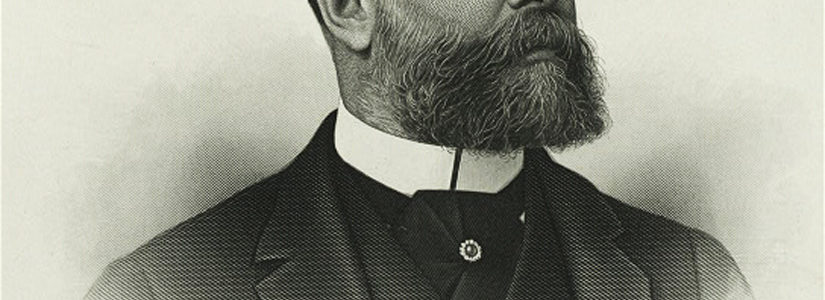
Remembering Ashbel P. Fitch
October 14, 2011 | by Anthony C. Wood, Founder & Chair
Article from the Fall 2011 Newsletter
The new book Ashbel P. Fitch: Champion of Old New York (Syracuse University Press, 2011) resurrects the legacy of a long-forgotten giant of 19th-century New York City while at the same time demonstrating the powerful light archives can cast upon otherwise dim corners of the City’s past. Ashbel P. Fitch was a four-term congressman from New York City (1886-1893) who also served one-term as New York City Controller (1894-1897). His status was such that it was widely speculated that he would run for mayor and win. His reputation as an honest member of Tammany Hall and his outspoken defense of New York City on the national scene made him popular at home, while his involvement with the national issues of the day—battles over tariffs, immigration policy, temperance, the gold standard, and the failed effort to secure the 1893 World’s Fair for New York City—earned him recognition well beyond the borders of New York City.
But Fitch’s passionate and eloquent defenses of New York City, his interactions with influential New Yorkers such as Grover Cleveland and Theodore Roosevelt, his curious relationship with Tammany Hall, and such eccentricities as his love of all things German and his long-term legal representation of New York’s German brewers, would all be lost to us if David Remington, Fitch’s great-grandson and author of this new book, had not been inspired to start digging into some old family papers. According to David, these papers consisted of “45 bound volumes of newspaper clippings, invitations, announcements…assembled in Fitch’s law office by his clerks. He had a clipping service for clippings nationwide wherein his name or some issue in which he was interested appeared. Over each clipping was written by hand the name of the paper, and the date of the article. There were 13 volumes devoted to his seven years in Congress, and 32 for his four years as comptroller.” They had survived the decades on the bookshelves of the family’s 150-year-old Adirondack camp that Fitch built on the shores of Ragged Lake, demonstrating dramatically the preservation benefits of cold, dry air. Found in a different building in the camp complex was a collection of family correspondence, including some 300 letters between Fitch and his wife, Elizabeth Cross Fitch.
David Remington devoted fifteen years to producing this book, a decade of which was spent sifting through the 9,000 pages of clippings found in the bound volumes. Because of Remington’s devotion and dedication, Fitch is now being rediscovered by New Yorkers, and familiar elements of the City are taking on new meaning. For example, 1388 Lexington Avenue, Fitch’s home for sixteen years in Manhattan’s Yorkville neighborhood, was purchased from George Ehret, New York’s largest brewer and at that time, Fitch’s most important client. Still standing today, this handsome brownstone, with its high mansard roof and dormer windows, was only blocks away from Old Homestead, a German social club that was owned by Jacob Ruppert (another prominent New York City brewer) at Third Avenue and East 91st Street.
Fitch’s friendship with these brewers was such that on the eve of his family’s departure for a year-long stay in Germany, several hundred members of the Old Homestead Club, accompanied by two German bands, marched to Fitch’s house for a late-night serenade. In light of this connection between 1388 Lexington Avenue and Ashbel Fitch, the building can be appreciated not only for its architectural beauty but for the tangible link it provides to the days when Yorkville still had its breweries, a robust German community, and the great civic leader Ashbel Fitch walked its streets. With this new book, and an increased awareness of Fitch’s contributions to New York City, perhaps a groundswell of support for the landmark designation of 1388 Lexington Avenue will result!
Not only does Ashbel P. Fitch: Champion of Old New York bring alive the man, it also reclaims his prose. His love of New York City is reflected in an address he gave in March of 1898 to the Sons of Oneida County. The words still ring true today.
New York always was the place for the man from somewhere else. It attracts to itself the brightest men in our state and from all the states, in every calling and profession, because here is the fairest chance for recognition, and the greatest reward for success. There is always ready here a gold box and the freedom of the city for any man from anywhere who can earn them. The question the city asks of the latest comer is not ‘where do you come from?’ but ‘where are you going?’ If you are going ahead in your profession or in your business or in the arts, and can lead the way, the city will welcome and reward you, as will no other place in America.
Thanks to this book, Ashbel P. Fitch is no longer a forgotten New Yorker. Now if only the likes of George McAneny, Arthur Holden, and so many other forgotten New Yorkers had inquisitive great-grandchildren around to rediscover them for our edification and enjoyment! Thank you, David Remington.